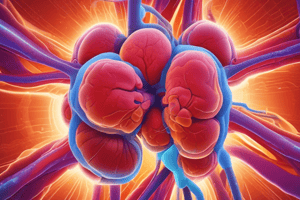Podcast
Questions and Answers
What is one of the criteria for diagnosing acute kidney injury (AKI)?
What is one of the criteria for diagnosing acute kidney injury (AKI)?
- A 50% increase in baseline serum creatinine within 7 days. (correct)
- A decrease in glomerular filtration rate of at least 5 mL/min.
- A rise in serum creatinine of at least 0.5 mg/dL within 24 hours.
- Urine output less than 0.3 mL/kg/h for at least 6 hours.
What is a common cause of prerenal acute kidney injury?
What is a common cause of prerenal acute kidney injury?
- Sepsis leading to reduced renal blood flow. (correct)
- Urinary tract obstruction.
- Acute tubular necrosis.
- Bladder cancer.
What percentage of hospitalized patients are estimated to be affected by AKI?
What percentage of hospitalized patients are estimated to be affected by AKI?
- 30-35%
- 3-5%
- 7-18% (correct)
- 20-25%
How can early interventions improve outcomes in AKI?
How can early interventions improve outcomes in AKI?
Which of the following is NOT a characteristic feature of acute kidney injury?
Which of the following is NOT a characteristic feature of acute kidney injury?
Flashcards are hidden until you start studying
Study Notes
Introduction
- Acute Kidney Injury (AKI) is a serious condition impacting hospitalized and critically ill patients
- Characterized by a rapid decrease in glomerular filtration rate (GFR) and the buildup of waste products like creatinine
- AKI can occur with or without a reduction in urine output
Definition
- Rise in serum creatinine (SCr) by at least 0.3 mg/dL (27 µmol/L) in 48 hours
- 50% increase in baseline SCr within 7 days
- Urine output less than 0.5 mL/kg/h for at least 6 hours
Epidemiology
- AKI affects 7-18% of hospitalized patients
- More than half of critically ill patients experience AKI
- Mortality increases with greater severity of AKI
Etiology and Pathophysiology
Prerenal AKI
- Accounts for 10-25% of AKI cases
- Caused by reduced renal blood flow, which can be triggered by:
- Systemic vasodilation
- Intravascular volume depletion (e.g., hemorrhage, dehydration, GI fluid losses)
- Reduced cardiac output (e.g., heart failure, myocardial infarction)
- Sepsis and liver disease
- Drugs interfering with auto-regulatory mechanisms (e.g., NSAIDs, ACE Inhibitors, ARBs)
Early Prevention and Treatment
- Early interventions like fluid resuscitation can enhance recovery
- Restoring renal blood flow before significant kidney damage occurs is crucial
Studying That Suits You
Use AI to generate personalized quizzes and flashcards to suit your learning preferences.




